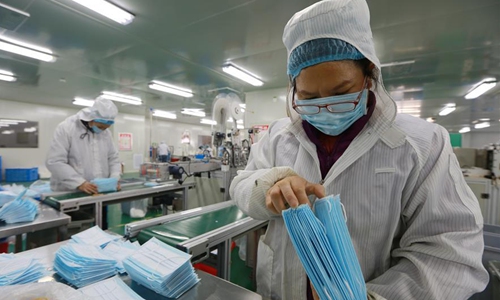HOME >> CHINA
Medical supply shortage haunts Hubei
By Chen Qingqing, Li Qiao and Shan Jie Source:Global Times Published: 2020/1/31 22:03:41

A worker arranges protective masks at the workshop of a company in Xiajiang, east China's Jiangxi Province, Jan. 29, 2020. To help fight the outbreak of pneumonia caused by novel coronavirus, workers of many medical material companies rushed to work ahead of schedule to make protective masks. Photo: Xinhua
Thousands of medical personnel from across China have been rushing to Hubei, bringing medical supplies, as the extreme shortage of medical supplies has been haunting the epicenter of the novel coronavirus in the country.
"Some frontline co-workers are betting with their lives. They have to save lives with or without sufficient supplies," an employee at the Union Hospital in Wuhan, capital of Central China's Hubei Province, told the Global Times on Friday.
Hospitals in Hubei have been posting on social media platforms, asking the public to donate supplies.
Cao Guangjing, vice governor of Hubei, admitted on Thursday at a press conference that the most needed supplies, such as protective clothing and N95 masks, have always been in short supply.
Pictures circulating online showed frontline medical staff making masks out of fabrics. Some of them, without protective suits, use huge plastic bags to cover themselves, some even use swimming goggles.
Hospital employees preferred not to be identified said many donated products do not meet the requirements for medical use.
A total of 6,129 medical personnel of 53 teams from national medical authorities, 29 provincial regions and three military hospitals had arrived in Hubei by Wednesday night, the CCTV reported Thursday.
Doctors and nurses brought medical supplies badly needed in Hubei. An aid team from East China's Shandong Province brought 100,000 masks, while the team from Northwest China's Xinjiang Uygur Autonomous Region brought respirators, electrocardiographs and medicine.
Zhang Liu, the leader of the medical team from Peking University People's Hospital in Beijing, told the Global Times that the constant changes and development of the disease make it difficult to apply treatment.
He said medical staff in protective clothing feel stuffy, sweaty and breath uncomfortably as the clothing is not breathable. Medical staff on duty for six hours wear diapers to avoid going to the bathroom and infecting patients.
Posted in: SOCIETY